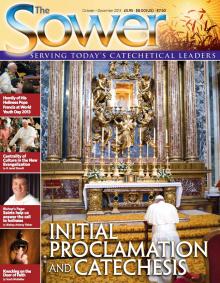Carol Harnett explains why when we give the initial proclamation of the Gospel, it is important both that we begin from the end and also from the beginning.
When we proclaim the faith we need to begin from the fullness of the end, from our destiny. We begin by speaking about purpose: why did God make me? Why did God create? We speak of the fullness to which we are called. Jesus sent His disciples out to tell the world about this great news, that we do not have to be separated from God for ever and that our destiny is to live life to the full, in Him.[1] This new life begins now and continues after our deaths in a glorious existence with Him. In the mean time, we are waiting for his return in glory at the end of time. Paragraphs 1-3 of the Catechism beautifully set the scene; man is called to know and love God, and God freely created us to share in His own blessed life.[2]
The rest of this online article is available for current Guild members.
This article is from The Sower and may be copied for catechetical purposes only. It may not be reprinted in another published work without the permission of Maryvale Institute. Contact [email protected]

















